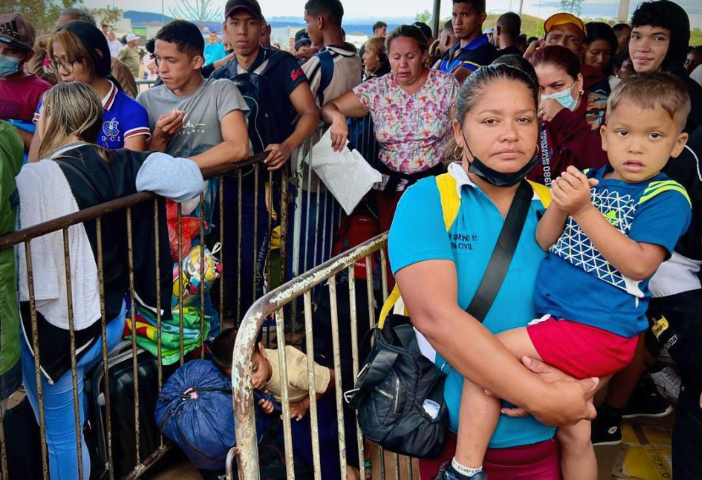The latest chapter in the ongoing political crisis in the Bolivarian Republic of Venezuela threatens to trigger a new wave of forced displacement across the hemisphere. The recent presidential elections, held on Sunday, July 28, concluded with the proclamation of President Nicolás Maduro as the winner. However, this declaration came without fulfilling critical steps in the vote-counting process as required by law, according to the country’s electoral authority.
The lack of transparency and integrity in the electoral process was confirmed by impartial observation missions, such as those sent by the Carter Center and the UN’s panel of electoral experts, who agreed that the results presented by the CNE do not reflect reality. The opposition and various citizen groups rejected the results, sparking a worrying cycle of state repression, with alarming reports of human rights violations against the Venezuelan civilian population.
As a result, 25 people have been killed during peaceful protests by state security forces or irregular armed groups under state protection. According to reports from the organization Foro Penal, by August 22, 1,503 people had been detained, including 129 adolescents, 14 indigenous individuals, 18 people with disabilities, chronic illnesses, or special needs and 200 women. In most cases, these detentions occurred arbitrarily, with detainees denied due process rights such as access to a trusted lawyer or knowledge of the charges against them.
In addition to direct repression, the government has attempted to further restrict civil space in the country. The recent enactment of the “Law on Supervision, Regulation, Action and Financing of Non-Governmental Organizations and Non-Profit Social Organizations” threatens the existence of thousands of organizations that provide humanitarian assistance and defend human rights in Venezuela.
The possibility of a new wave of forced displacement
For over a decade, Venezuela has faced a complex political, economic, social and humanitarian crisis that has forced over 7.7 million people to flee the country, with 6.5 million now residing in Latin America and the Caribbean. The recent elections were closely watched by the international community due to their potential to lay the groundwork for a peaceful transition to democracy, which could address the causes that have driven over 20% of the Venezuelan population to leave the country in recent years.
During the electoral campaign, a study conducted by the polling firm Poder y Estrategia on July 20 revealed that 18% of respondents expressed a desire to emigrate, although they had no concrete plans to do so. Meanwhile, 6% of participants stated they already had plans in place to leave the country.
As the political crisis deepens, migration data from countries sharing land borders with Venezuela indicate an increase in border crossings, particularly in Brazil. Colombia has also seen a slight rise in daily averages, while there is a notable increase in the proportion of people fleeing Venezuela due to human rights violations and political repression.
The potential for a new wave of migration arises at a time when migration policies in the region are regressing. The increasing militarization of borders in some countries, the lack of mechanisms to ensure regular migration, the reluctance to implement the Cartagena Declaration on Refugees, the growing demand for visas to allow migrant entry and deportation plans are causing great concern, as they only increase risks for displaced people.
Compounding the issue, international cooperation funds aimed at supporting the humanitarian response to Venezuelan migration in the region are far below what is needed. According to data from the R4V platform, as of August 12, only 12.5% of the resources required to fund the 2024 refugee and migrant response plan—estimated at more than $1.5 billion—had been covered.
Urgent need to protect displaced people
Given this situation, it is crucial for countries in the hemisphere to take steps to ensure that people displaced by the crisis in Venezuela have guarantees of international protection or expedited mechanisms for regularizing their migration status. The Venezuelan crisis is a reminder of the need to update protection frameworks for displaced people in the hemisphere and ensure adequate responses to the challenges the continent faces today. The refugee definition established in the Cartagena Declaration provides a clear legal framework for automatically recognizing Venezuelan displaced people as refugees.
Given the evidence documented by impartial international organizations, such as the UN High Commissioner for Human Rights (OHCHR) and the Inter-American Commission on Human Rights (IACHR), regarding the human rights situation in Venezuela, recognizing Venezuelan citizens as refugees is a coherent stance aligned with international human rights law. This measure should not be interpreted as an unfriendly action toward the country of origin of the displaced people.
In this regard, there are already exemplary cases, such as Brazil’s decision to adhere to the refugee definition established in the Cartagena Declaration, granting international protection to over 130,000 Venezuelan citizens in the country.
It is also crucial to alert the international community about the need to reactivate assistance programs for Latin American countries in their efforts to receive, protect and integrate Venezuelan migrants. Renewing commitments to cooperation and funding for response plans to this migration crisis in the region is imperative.
The crisis in Venezuela and its impact on the Americas demand solidarity from all. It is urgent to implement coordinated actions that place the victims at the center of the measures.












